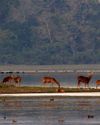
Today, India boasts over 100 national parks and a plethora of wildlife sanctuaries, which together cover around 5% of the country’s geographical area. These parks serve multiple roles— protecting biodiversity, ensuring ecological balance, and providing a refuge for endangered species such as the Bengal tiger, Vultures, Sea Turtles, Great Indian Bustards and Indian rhinoceros. The importance of national parks in India is not limited to wildlife conservation; they also play a crucial role in preserving traditional ecosystems, enhancing carbon sequestration, providing employment opportunities through ecotourism, and promoting research and education.
Relevance of Wildlife Parks in Today’s Context In an era characterized by climate change, habitat destruction, and increasing humanwildlife conflict, the role of national parks has become even more significant. Climate change poses severe threats to ecosystems, which in turn affects the wildlife that depends on them for survival. National parks serve as vital climate refuges, providing safe habitats where species can adapt to changing conditions.
Moreover, the rise in human populations and urban encroachment into natural habitats has increased the demand for land and resources, leading to conflicts between wildlife and humans. Wildlife parks provide a buffer zone, allowing for the co-existence of humans and wildlife. They often engage local communities through inclusive management practices, fostering awareness and reducing conflicts, thereby promoting a sense of stewardship among residents.
This story is from the Travellers' World : Travel and Environment Aug-Sept 2024 edition of Travellers' World.
Start your 7-day Magzter GOLD free trial to access thousands of curated premium stories, and 9,000+ magazines and newspapers.
Already a subscriber ? Sign In
This story is from the Travellers' World : Travel and Environment Aug-Sept 2024 edition of Travellers' World.
Start your 7-day Magzter GOLD free trial to access thousands of curated premium stories, and 9,000+ magazines and newspapers.
Already a subscriber? Sign In

National Parks Of India
India is blessed with a rich tapestry of biodiversity that is both a natural heritage and a national treasure. The concept of national parks in the country traces back to the late 19th century when the importance of conserving wildlife began to take root in the consciousness of the colonial administration. The first national park in India, Hailey National Park (now known as Rajaji National Park), was established in 1936, marking a historic commitment to wildlife conservation. The post-independence era saw an exponential increase in protected areas, primarily driven by a need to conserve India’s unique flora and fauna threatened by rampant industrialization and urbanization.

10 Fascinating Wildlife Sanctuaries
TO EXPLORE THE WILD SIDE OF INDIA

Conversation with the "BOOK MARKETING GIRL"
In an age where digital advancements and artificial intelligence often overshadow traditional practices, two visionaries have chosen a different path.

FARM AAVJOSAA - HER STORY
“Riddhi was a whirlwind of energy, unable to endure even a minute apart from her twin, Siddhi.

FOOD MEETS FANTASY IN CROATIA
As the sun dipped below the horizon, casting a warm golden glow over the rolling hills of Croatia, Foodpreneur Debaditya Chaudhury found himself on a gastronomic adventure that promised to tantalize his taste buds and inspire his culinary creativity.

THE UNTAMED BEAUTY OF SATPURA TIGER RESERVE
In Conversation with L. Krishna Moorthy, The Field Director of Satpura Tiger Reserve

SUNDARBANS THROUGH THE DECADES
As Witnessed By Anil Mistry, The Swamp Tiger Rescuer

LOOK EAST - WILDLIFE AND TOURISM IN THE NORTHEAST OF INDIA.
The North East of India is an ecological and biodiversity hotspot. Diverse habitats and ecosystems - each with its own species of birds, animals and plants – make this region home to an abundance of flora and fauna.

KAZIRANGA NATIONAL PARK AND TIGER RESERVE
There is a mad frenzy for travelling in recent times. Everywhere you look, read, or hear, people travel worldwide, domestic, offbeat travel has become a trend.

CORBETT NATIONAL PARK: A Legacy of Conservation and Biodiversity
From the moment I set foot in the enchanting and tranquil realm of Corbett National Park, a deep connection was forged in my heart.